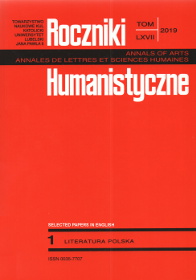On Bruno Schulz’s Demythologization of Reality
On Bruno Schulz’s Demythologization of Reality
Author(s): Wiktoria DurkalewiczSubject(s): Language and Literature Studies, Studies of Literature, Polish Literature
Published by: Towarzystwo Naukowe KUL & Katolicki Uniwersytet Lubelski Jana Pawła II
Keywords: Bruno Schulz; personal myth; negative value; regression; rewriting; demythologization; The Homeland; trauma; self-narration
Summary/Abstract: The Polish version of the article was published in Roczniki Humanistyczne vol. 62, issue 1 (2014). This article is an attempt at an analysis of the changes occurring in the area of Schulz’s narrative identity that is being constituted. It is assumed that the turning point for Schulz’s personal myth was first of all the success of The Street of Crocodiles and a number of events in his personal life (splitting up with his fiancée, his brother’s death, his health problems). Each of these factors starts to influence, in its own way, the writer’s questioning of the possibility to continue writing, that is, interpreting the world, discovering history, “making reality sensible.” The success of The Street of Crocodiles becomes a challenge that is difficult to respond to in these new conditions. The writer’s “brilliant epoch,” the epoch of “writing for himself,” comes to an end. The “Schulz” issue is in danger of sinking into oblivion. The narrative space is gradually transformed into a space of coping with alienation, division, loneliness. These motifs are articulated in a special way in the stories Dodo, The Pensioner, and Loneliness. If, in these stories, overcoming failure in life is indeed impossible (Dodo) or proceeds owing to “sponging off somebody [else]’s life” (The Pensioner), or “parasitizing metaphors” (Loneliness), in The Homeland the rewriting of an individual myth ab origine takes place. The act of this “rewriting” is understood as consequently departing from the basic principles of Schulz’s literary hermeneutics and philosophy of literature. The reality appearing as a result of this departure is a reality that is not rooted in genuine experience, a quasi-reality of “negative values,” a reality of a narrative disaster signaling the definitive “death of Bruno the Great.”
Journal: Roczniki Humanistyczne
- Issue Year: 67/2019
- Issue No: 1SP
- Page Range: 83-111
- Page Count: 29
- Language: English

